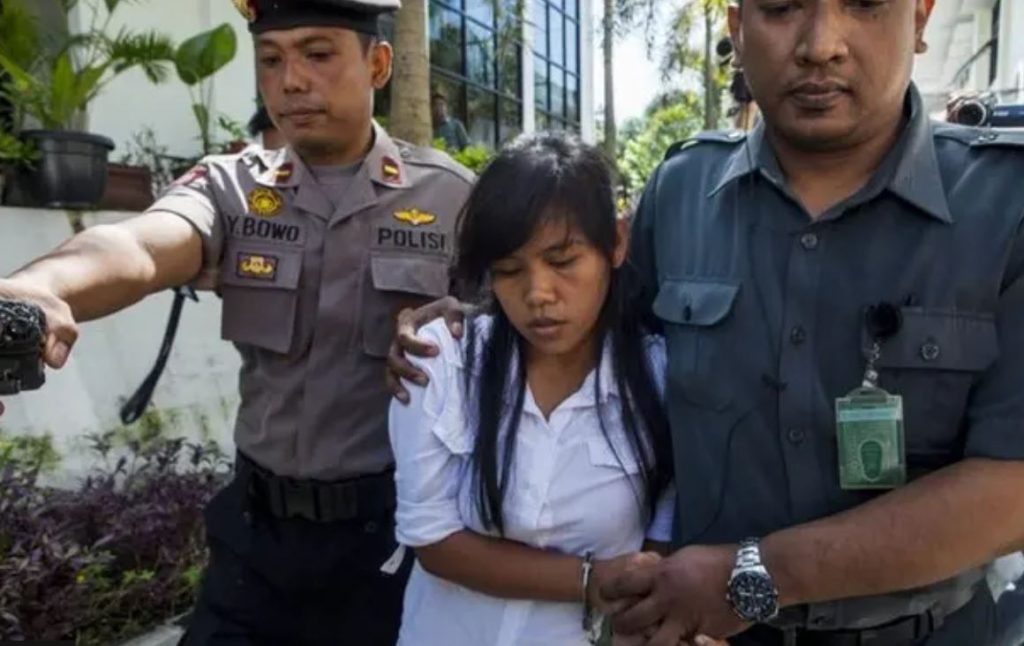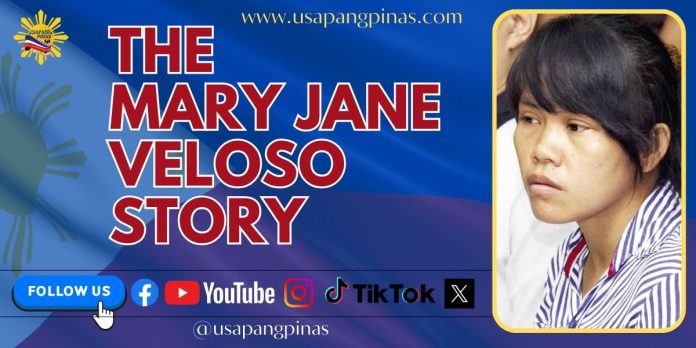November 20, 2024 – After nearly fourteen years of arduous imprisonment and uncertainty, Mary Jane Veloso, a Filipina national, has finally been pardoned by the Indonesian government and is set to return home to the Philippines. Veloso’s case has been a focal point of international human rights discussions, diplomatic negotiations, and public sympathy, highlighting the complexities of drug enforcement policies and the human cost behind stringent anti-drug operations.
The Arrest in 2010: A Turning Point
In November 2010, life took an unexpected turn for Veloso. On the night of November 19, she was arrested at Juanda International Airport in Surabaya, Indonesia, with over 2.6 kilograms of heroin.” The revelation came as a shock not only to her family but also to the Filipino community, sparking debates about the circumstances surrounding her arrest.
Authorities charged Veloso under Indonesia’s stringent drug laws, which do not discriminate between citizens and non-citizens in their application. The gravity of the charges carried severe penalties, including life imprisonment or even the death penalty. Veloso’s incarceration ignited a prolonged legal battle and became symbolic of the Philippines’ diplomatic struggles with Indonesia over extraterritorial drug offenses.
Life Behind Bars: Struggles and Support
Veloso’s imprisonment was characterized by hardships that resonated deeply with human rights advocates. Reports highlighted inadequate living conditions, limited access to legal representation, and the psychological toll of prolonged incarceration. Despite these challenges, Veloso maintained her resolve, clinging to hopes of pardon and release.
Back in the Philippines, Veloso’s case garnered significant attention. Advocacy groups, human rights organizations, and public figures rallied for her freedom, emphasizing the need for fair legal proceedings and compassionate treatment. Recognizing the diplomatic complexities, the Philippine government continuously negotiated with Indonesian officials, striving to secure her release.
Legal Battles and Diplomatic Efforts
Over the years, Veloso’s legal team worked tirelessly to challenge the evidence and the circumstances of her arrest. They argued that Veloso was coerced into smuggling drugs, a claim that added layers of complexity to the case. The defense posited that Veloso’s involvement was a result of manipulation and undue influence, aiming to shift accountability.
Diplomatic efforts were equally persistent. Successive Philippine administrations sought avenues to appeal for Veloso’s release, utilizing bilateral talks, legal channels, and international human rights platforms. These endeavors underscored the broader implications of Veloso’s case, reflecting the ongoing discourse on judicial fairness and the human rights landscape in Southeast Asia.
Public Sentiment and Cultural Impact
Mary Jane Veloso became a symbol of resilience and the quest for justice in the Philippines. Her story was widely covered in media outlets, documentaries, and literary works, contributing to a cultural narrative that questioned the balance between law enforcement and humanitarian considerations.
Public sentiment remained largely sympathetic towards Veloso, viewing her not merely as a convicted offender but as a victim of circumstance deserving of mercy and a second chance. This collective empathy played a crucial role in maintaining international attention and support for her cause.
Pardoning and the Path to Freedom
Fast forward to November 20, 2024, Mary Jane Veloso’s prolonged ordeal concludes as the Indonesian government announces her pardon. This decision marks a significant milestone in her journey, underscoring the interplay of legal advocacy, diplomatic negotiations, and public support that permeated her nearly fourteen-year imprisonment.
The pardon, granted through a combination of clemency petitions and compelling extenuating circumstances, reflects Indonesia’s acknowledgment of the complexities surrounding Veloso’s case.
Veloso’s Repatriation: A Welcome Home
Philippine President Ferdinand Marcos Jr. announced on Wednesday that an agreement has been finalized for Indonesia to return Mary Jane Veloso back to the Philippines to complete her sentence.
In a statement, Marcos expressed gratitude towards Indonesian President Prabowo Subianto and his administration for agreeing to the Philippines’ long-standing request to repatriate Veloso. “Mary Jane Veloso is coming home,” Marcos declared.
While the exact date of Veloso’s return has not been specified, Marcos conveyed his anticipation of her arrival in the Philippines. Indonesia’s Coordinating Minister for Law, Human Rights, and Immigration, Yusril Ihza Mahendra, confirmed that President Subianto has approved Veloso’s transfer, which is expected to occur in December, provided all conditions are satisfied. One key condition is that Veloso remains detained in Indonesia as part of her court-imposed sentence.
President Marcos also mentioned that the Philippines would be responsible for the costs associated with Veloso’s repatriation. Philippine Foreign Undersecretary Eduardo de Vega stated that Filipino officials would negotiate the legal framework for Veloso’s transfer with their Indonesian counterparts.
Veloso’s return to the Philippines is scheduled for the coming weeks, where she will be welcomed by her family, supporters, and a nation that eagerly awaits her homecoming. Her repatriation ceremony is anticipated to be a moment of national significance, celebrating not only her return but also the triumph of perseverance of the Philippine government and international solidarity.
Returning to the Philippines would prevent Veloso from facing execution, as the Philippines has abolished the death penalty and is the largest Roman Catholic nation in Asia.
Back in 2015, Indonesian authorities moved Veloso to Nusakambangan prison island, where she and eight other drug offenders were scheduled for execution by firing squad, despite objections from their home countries, including the Philippines, Australia, Brazil, France, Ghana, and Nigeria. Indonesia has successfully executed the eight drug convicts except veloso.
Why was Veloso Exempted From Execution?

Mary Jane Veloso’s execution was put on indefinite hold due to a Moratorium on Capital Punishment enacted by Indonesian President Susilo Bambang Yudhoyono. She received an 11th-hour temporary reprieve from Indonesian President Joko Widodo just before her scheduled execution, making her the only one spared at that moment.
A moratorium on capital punishment is typically a temporary suspension of executions and potentially death sentences, depending on key decision makers’ will. It is a way for a state to suspend executions of people sentenced to death, while the death penalty remains in effect in the country’s laws and death sentences are still being passed.
The Aftermath: Lessons and Legacy
Mary Jane Veloso’s case leaves a strong bond on the Philippines and Indonesia’s diplomatic relations and legal frameworks. It serves both governments to look deeply at drug policies, human rights protections, and the responsibilities of nations towards their citizens abroad.
Reform in Legal Frameworks
The prolonged nature of Veloso’s case has prompted debates on the efficacy and humanity of extraterritorial drug laws. Advocates argue for reforms that distinguish between trafficking agents and victims, promoting rehabilitation over punitive measures. The Philippine government, drawing lessons from Veloso’s experience, has been actively engaging in policy reviews to ensure better protection for its citizens overseas.
Strengthening Diplomatic Ties
The case underscored the necessity for robust diplomatic channels and international cooperation in addressing crimes that transcend borders. Strengthened communication and mutual understanding between the Philippines and Indonesia have been instrumental in resolving not only Veloso’s case but also in setting precedents for future diplomatic engagements.
Humanizing Legal Narratives
Veloso’s story has shifted the narrative from statistics to personal human experiences within the legal system. This humanization has influenced media portrayals, legal discourse, and public empathy, fostering a more nuanced understanding of the individuals behind criminal charges.
Global Human Rights Perspectives
On a global scale, Veloso’s case echoes ongoing discussions about the balance between combating drug trafficking and upholding human rights. International bodies have taken note of her prolonged imprisonment, using it as a reference point in advocating for fair trial standards and humane treatment of detainees.
Advocacy and Awareness
Human rights organizations have leveraged Veloso’s case to raise awareness about the challenges faced by foreign nationals accused of drug offenses. Campaigns emphasizing legal support, psychological assistance, and policy advocacy have been amplified, striving to prevent similar prolonged incarcerations in the future.
International Legal Reforms
The international community, observing the implications of Veloso’s case, continues to debate and implement legal reforms aimed at harmonizing anti-drug laws with human rights protections. These reforms seek to ensure that anti-drug measures do not inadvertently violate fundamental freedoms and dignities of individuals.
Mental and Emotional Fortitude
Veloso’s ability to endure the psychological stresses of imprisonment highlights the importance of mental health support for incarcerated individuals. Her experience advocates for comprehensive support systems that address the emotional and psychological well-being of detainees, regardless of their circumstances.
A Journey from Darkness to Light
As Veloso steps onto Philippine soil once more, she carries with her not just the weight of her experiences but also the collective aspirations of those who advocated for her freedom.
In reflecting upon Mary Jane Veloso’s path, societies worldwide are reminded of the profound human stories that lie behind headlines and legal statutes. Her repatriation serves as a call to action for continual reassessment of legal practices, diplomatic relations, and the enduring quest for compassionate justice.
For Further Information
- Philippine Department of Foreign Affairs: For official statements and updates on Mary Jane Veloso’s repatriation.
- Human Rights Watch: For reports on Mary Jane Veloso’s case and broader implications on human rights in Southeast Asia.
- Legal Advocacy Groups: Organizations working towards legal reforms inspired by Veloso’s journey.
- Community Support Networks: Initiatives aiding in Veloso’s reintegration and supporting similar cases.
This article is a comprehensive overview of Mary Jane Veloso’s journey from her arrest in Indonesia in 2010 to her anticipated return to the Philippines in 2024. It encapsulates the legal, diplomatic, and personal dimensions of her experience, highlighting the broader implications for international legal practices and human rights advocacy.
